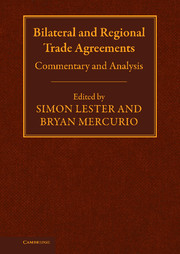Book contents
- Frontmatter
- Contents
- List of contributors
- Acknowledgements
- Foreword
- Table of cases
- Table of Treaties and International Agreements
- Table of abbreviations
- Part I Introduction
- Part II Economics and politics of PTAs
- 2 The economics of PTAs
- 3 The political economy of PTAs
- 4 Bilateral and plurilateral PTAs
- Part III Relationship with WTO and international law
- Part IV Legal aspects of PTAs: A comparative analysis
- Index
- References
3 - The political economy of PTAs
Published online by Cambridge University Press: 16 December 2009
- Frontmatter
- Contents
- List of contributors
- Acknowledgements
- Foreword
- Table of cases
- Table of Treaties and International Agreements
- Table of abbreviations
- Part I Introduction
- Part II Economics and politics of PTAs
- 2 The economics of PTAs
- 3 The political economy of PTAs
- 4 Bilateral and plurilateral PTAs
- Part III Relationship with WTO and international law
- Part IV Legal aspects of PTAs: A comparative analysis
- Index
- References
Summary
Introduction: Re-thinking the paradigm of Bilateral/Regional Trade Agreements
Why do countries conclude bilateral/regional trade agreements? Numerous researchers have sought to answer this question, most often through creating a typology of the agreements. Such efforts, however, have been in vain. A bilateral/regional trade agreement is rarely, if ever, based on a single motive, and two or more parties to an agreement can often have different and sometimes even conflicting objectives (e.g., one seeking market access and the other political support). In fact, different actors within each country itself can also have different objectives (e.g., one sector seeking trade creation whilst another trade diversion). Thus, any typology is bound to create artificial categories, and would not necessarily give a proper or accurate answer to the original question.
Sometimes, countries fall into a similar trap by trying to explain the rationale behind their bilateral/regional trade policy. For example, the European Commission recently acknowledged that it had been predominantly motivated by political considerations in concluding trade agreements with countries that were candidates for European Union (EU) membership (with the exception of Mexico, South Africa, and Chile). Although such a policy is in line with the EU's neighbourhood and development objectives, it does little to serve the EU's central trade interests.
- Type
- Chapter
- Information
- Bilateral and Regional Trade AgreementsCommentary and Analysis, pp. 28 - 51Publisher: Cambridge University PressPrint publication year: 2009
References
- 3
- Cited by



